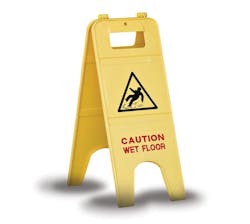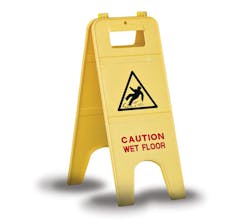Dental ethics: Relapses in ethical conduct can be based on even the little slips
By Jannette Whisenhunt, RDH, BS, MEd, PhD
One thing that can make working in a dental office very difficult is working with someone who is "unethical." Do you recognize it when you see it? Sometimes it can be very difficult to see or realize that it is happening. We have all heard of "those offices" that get caught with Medicaid fraud or are doing substandard work. If you were an employee in an office that got caught and closed down because of doing unethical practices, would you be able to see it before it happened?
In dental hygiene school, we all studied our state's rules and regulations, and what was legal and what was not. It is very clear to me that many dentists and dental professionals who seem to "look the other way" when it comes to those rules just cross their fingers that they won't get caught.
A past graduate from 22 years ago talked with me the other day about some of the things that offices do that are not ethical. The events seem to continue to happen, and people just put up with it. Are you in an office that allows dental assistants to do intraoral skills that are not legal in your state? Is your office charging for procedures that are not performed? Do the dental professionals in the office look the other way when they see something that is not quite right? When does it become "your" problem?
In a perfect office, everyone would act ethically, and all patients would be taken care of in a responsible manner and everyone involved would follow all the rules. But we don't live in a perfect world, do we? We can't be naive to think that it won't happen in our offices.
It does not have to be full-blown malpractice issues. Even the little things can cause ethical issues. Look over the following examples and see if any of them are happening in your office. The main question then is: What will you do about it to keep it from continuing and not being the one that "looks the other way" anymore?
- Patient thinks, "I am not going to tell the dental hygienist that I didn't take my premed. I want to get my teeth cleaned, and I just forgot it today." This is called contributory negligence on the patient's part, if the dental hygienists asks the patient and he or she then lies. If the RDH does not ask the patient if the premed was taken, then professional and contributory negligence both occur, and, if harm occurs to the patient, both at fault.
- One dental hygienist states to the another dental hygienist in the practice: "Dr. Jones is a quack. I just had to tell his patient that was going to him for years that she had periodontal disease. She said that Dr. Jones cleaned her teeth! Great job he did!" This is defamation. Slander just occurred because it was said to a third party about that doctor. It is called libel if it actually got written down. You have to be very careful not to document statements that defame other professionals.
- "I will just change the date to make it for tomorrow so your insurance will pay it for you. That's no problem at all." Post-dating something is "insurance fraud," and is considered a criminal act. Don't do it, even when it seems like the right thing to do in order to help the patient out. Unfortunately, this occurs and is one of the common things that others look the other way about.
- "Oh, no! Mr. Smith fell on the hall's wet floor where I just mopped." This is standard negligence and can happen in any kind of business. Make sure you have "wet floor signs" out when floors are slippery.
- "I don't have time to perio chart this patient. If I skip it this time, I'll do it next time. I have to get back on schedule!" If harm occurs, then this is outright malpractice and is called "omission" because you did not do something that was the standard of care. If no harm occurs, then it is still professional negligence that occurred, but no one knows about it except you (and the next dental hygienist who has that patient).
- The office manager asks dental hygienist to bring a copy of license to put in the operatory. The dental hygienist keeps forgetting. It is now April 1, and she still doesn't have it. After March 31, a certain date that you should know for your state, then the license is no longer valid, and you would have to get new one. If not renewed, then she is practicing without a valid license. The office manager cannot let the dental hygienist work any longer at the office, or the dental hygienist can be guilty of criminal behavior. Practicing without a license is not something you want to be guilty of!
- "I don't care if that patient comes back or not. I will not see her again. She is not worth dealing with, since I don't like her." If the dental hygienist does not reschedule patient for recare, but tells her she will call her later, but never does, then this is abandonment or breach of contract. This is not a reason that you can stop seeing a patient. There are certain procedures for a dentist (not the dental hygienist) to go through to release a patient.
- "I will just put down on this that we did the quad scale this time, and the insurance will pay that amount. Then we will just do the normal cleaning, and then you won't have to pay out of pocket this time. I know it is hard since your husband lost his job. The insurance company doesn't really care one way or the other. You are the one paying the premiums every month." Adding something in that wasn't done-no matter what the reasons are-is considered insurance fraud, which is a criminal act. The office can be closed down because of this, and the dentist can lose all licenses to work.
- "Oh, I'm sorry I cut your tissue a little bit there. I haven't used this scaler in a while. I just about forgot which way it goes in there." This is considered malpractice because of "commission," which means you did something that you should not have done. Your instrumentation skills were lacking, and the patient was harmed. This can also be a dental assistant who is allowed to perform skills that they do not have the proper certifications to do. Unfortunately, this is done every day in many offices!
I hope all of these examples are not things that ever happen in your office. However, I know that many of you will read one of the examples that may have rung a bell. Maybe you can do something about it in your office.
Our patients deserve an office that looks out for them. We would want that ethical standard for ourselves. We can make sure that we are following all of our state's rules and regulations. Even the little things that may not seem to be a big deal can become a big deal if the patient is harmed in any way. Let's not "look the other way" anymore, but always do what is right. Our dental hygiene code of Ethics require it! RDH
Jannette Whisenhunt, RDH, BS, MEd, PhD, is the Department Chair of Dental Education at Forsyth Technical Community College in Winston-Salem, N.C. Dr. Whisenhunt has taught since 1987 in the dental hygiene and dental assisting curricula. She has a love for students and served as the state student advisor for nine years and has won the student Advisor of the Year award from ADHA in the past. Her teaching interests are in oral cancer, ethics, infection control, emergencies and orofacial anatomy. Dr. Whisenhunt also has a small continuing education business where she provides CE courses for dental practices and local associations. She can be reached at [email protected].

